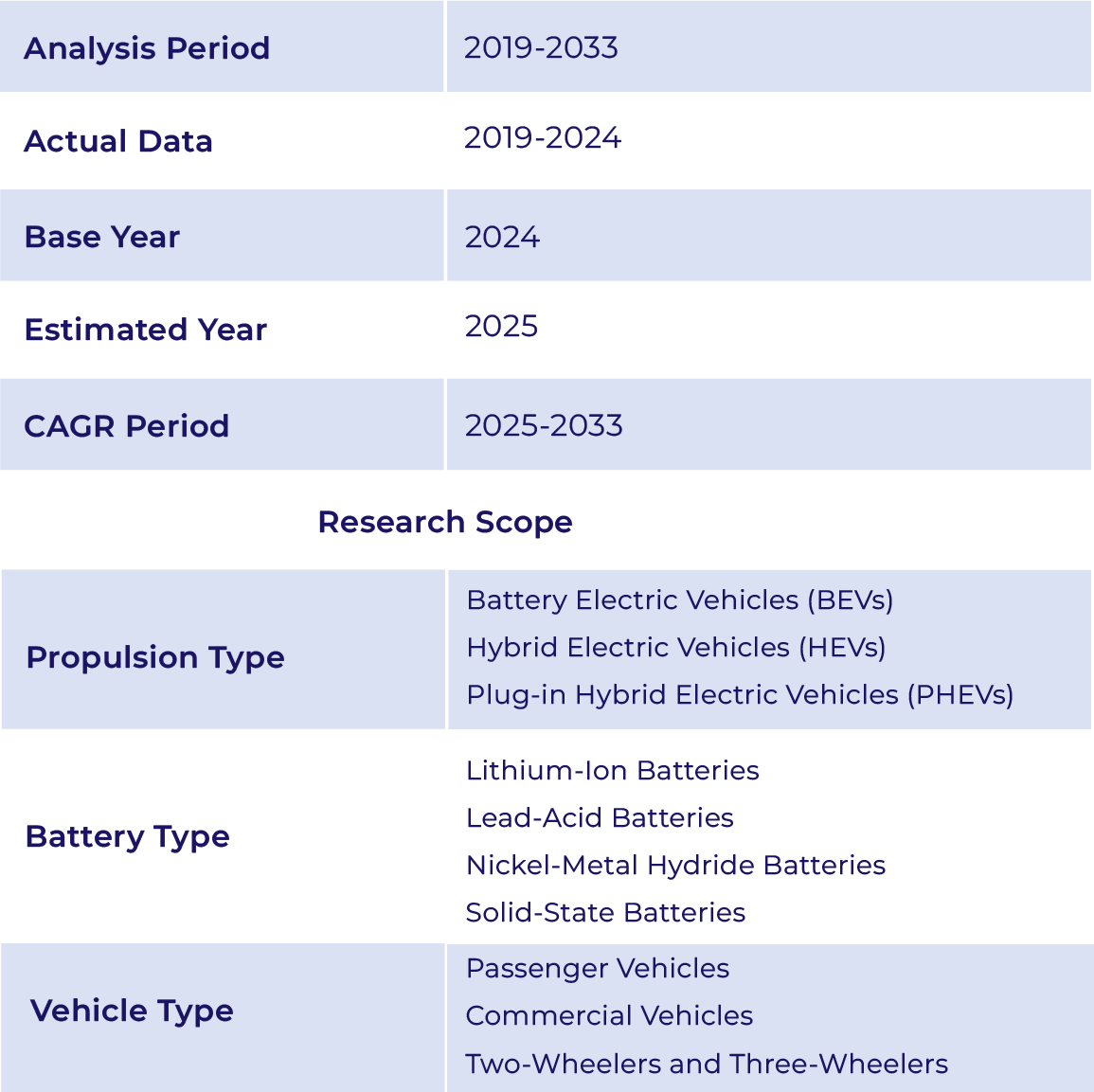Report Format:
![]()
![]() |
Pages: 110+
|
Pages: 110+
Vietnam Electric Vehicle Battery Market Growth and Performance
- In 2024, Vietnam EV battery sector witnessed a notable XX% annual growth, reaching a total market value of US$ XX million.
- Also, the market is projected to expand at a CAGR of XX% over the forecast period, scaling up to US$ XX million by the end of 2033.
Vietnam Electric Vehicle Battery Market Outlook
Vietnam is accelerating its momentum in the global electric vehicle (EV) battery market, driven by supportive policy frameworks and a forward-looking investment climate. The Vietnamese government continues to incentivize battery electric vehicle (BEV) adoption, extending the 0% registration fee for BEVs through 2027—demonstrating long-term commitment to decarbonizing the transport sector. Market demand is surging in tandem. EV and hybrid vehicle sales reached an impressive 97,000 units in 2024, accounting for over 22% of new passenger vehicle registrations. This exponential growth is reshaping consumer preferences and signaling Vietnam’s readiness to scale its battery production ecosystem.Yet, challenges persist. According to the Global Lithium-Ion Battery Supply Chain Ranking, Vietnam currently ranks 20th globally, highlighting a nascent supply chain. Recognizing this gap, Vietnam is actively attracting foreign investors and nurturing local enterprises to build a vertically integrated battery industry. In essence, with rising consumer interest and expanding local production initiatives, Vietnam is positioning itself as an emerging force in the EV battery industry of Southeast Asia.
Vietnam Electric Vehicle Battery Market Drivers
Vietnam’s rise in the EV battery space is underpinned by a confluence of natural resource availability, government backing, and private-sector dynamism. The country possesses valuable reserves of rare earth elements and nickel, essential to lithium-ion battery production, giving it a strategic advantage in localizing raw material supply chains. Pro-investment policy measures are a cornerstone of growth. The Vietnamese government continues to offer tax exemptions, streamlined land acquisition processes, and capital incentives for battery and EV-related investments. These policies have lured global players, including VinFast, which is not only expanding locally but also investing in international markets like India—an indicator of Vietnam's growing industrial confidence. The domestic market provides a strong pull factor. Rapid urbanization and increasing environmental awareness have catalyzed EV adoption across both passenger and commercial vehicle segments. Concurrently, Vietnam’s central location in Southeast Asia makes it a logistical hub for battery exports, inviting regional supply chain integration. Additionally, partnerships between Vietnamese firms and foreign investors are transferring cutting-edge battery technology and enhancing manufacturing standards. Selex Motors’ recent funding round underscores growing investor interest in startups developing integrated EV solutions, from battery swapping to cloud-connected fleets. Altogether, Vietnam's blend of mineral wealth, policy support, and regional strategic value is propelling its EV battery market into a fast-expanding growth trajectory.
Vietnam Electric Vehicle Battery Industry Trends
Vietnam’s EV battery industry is undergoing a phase of modernization, propelled by integrated production models, sustainability goals, and growing investor interest. A major trend is the development of battery swapping infrastructure tailored for two-wheelers and delivery fleets, spearheaded by startups like Selex Motors. Their smart batteries and modular design architecture are reshaping how electric mobility operates in urban Vietnam. Another pivotal trend is infrastructure investment. According to Vietnam Investment Review, local and international companies are increasingly interested in building EV battery and charging infrastructure. This includes plans for public-private partnerships to support nationwide deployment of charging stations and battery manufacturing clusters.In line with global sustainability standards, Vietnam is moving toward localized supply chains to reduce its reliance on imports. This involves expanding domestic processing capabilities for critical materials and increasing R&D spending on battery chemistry innovations, including solid-state batteries. Vietnam’s emphasis on export-oriented production is also driving trends in design efficiency and compliance with international safety standards. As firms like VinFast eye international markets, they are adopting global certifications and scaling production lines to meet rising overseas demand.
Vietnam Electric Vehicle Battery Industry Development
Recent developments reflect Vietnam’s accelerating role in the global EV battery ecosystem. VinFast, the country’s flagship EV manufacturer, has committed to significant international expansion—including an EV production investment in India—highlighting its ambition to become a global brand and extend Vietnam's technological footprint abroad.On the home front, Vietnam is witnessing a growing ecosystem of startups and institutional investors backing EV battery development. Selex Motors recently raised $3 million from ADB Ventures and other investors, supporting its plans to expand battery swapping infrastructure and smart battery production, especially for e-motorbikes and delivery fleets. The policy environment is also becoming more conducive. As detailed in recent legal reviews, Vietnam is working to streamline investment procedures and provide additional incentives to battery manufacturers, including extended tax holidays and access to R&D funds. This regulatory evolution is essential for attracting long-term capital and fostering innovation.Meanwhile, international battery suppliers are showing heightened interest in Vietnam’s manufacturing and infrastructure potential. According to reports, suppliers are eyeing partnerships to co-develop battery parks and localized assembly lines, enabling faster deployment across the ASEAN region
Together, these developments underscore Vietnam’s progress in building a comprehensive EV battery value chain, integrating production, investment, and international collaboration.







